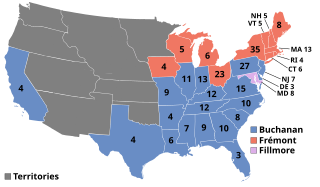This page is based on this
Wikipedia article Text is available under the
CC BY-SA 4.0 license; additional terms may apply.
Images, videos and audio are available under their respective licenses.

The United States presidential election of 1856 was the 18th quadrennial presidential election, held on Tuesday, November 4, 1856. In a three-way election, Democrat James Buchanan defeated Republican nominee John C. Frémont and American Party nominee Millard Fillmore.
A one-party state, single-party state, one-party system, or single-party system is a type of state in which one political party has the right to form the government, usually based on the existing constitution. All other parties are either outlawed or allowed to take only a limited and controlled participation in elections. Sometimes the term de facto one-party state is used to describe a dominant-party system that, unlike the one-party state, allows democratic multiparty elections, but the existing practices or balance of political power effectively prevent the opposition from winning the elections.
Christian democracy is a political ideology that emerged in nineteenth-century Europe under the influence of Catholic social teaching, as well as Neo-Calvinism. Christian democratic political ideology advocates for a commitment to social market principles and qualified interventionism. It was conceived as a combination of modern democratic ideas and traditional Christian values, incorporating the social teachings espoused by the Catholic, Lutheran, Reformed, and Pentecostal traditions in various parts of the world. After World War II, the Protestant and Catholic movements of the Social Gospel and Neo-Thomism, respectively, played a role in shaping Christian democracy. Christian democracy continues to be influential in Europe and Latin America, although it is also present in other parts of the world.

The Lithuanian Farmers and Greens Union is a centre-right agrarian political party in Lithuania led by industrial farmer Ramūnas Karbauskis.

The European Democratic Party (EDP) is a centrist European political party in favour of European integration. It was initiated on 16 April 2004 and formally founded on 9 December 2004 in Brussels. François Bayrou of the French Democratic Movement (MoDem) and Francesco Rutelli, former leader of the Democracy is Freedom and Alliance for Italy parties, serve as the two co-presidents.
Liberalism and radicalism in France refer to different movements and ideologies.

The Union of Democratic Forces is a political party in Bulgaria, founded in 1989 as a union of several political organizations in opposition to the communist government. The Union was transformed into a single unified party with the same name. The SDS is a member of the European People's Party (EPP). In the 1990s the party had the largest membership in the country, with one million members, but has since splintered into a number of small parties totaling no more than 40,000 members. The SDS proper had 12,000 members in 2016.
This article gives an overview of liberalism in Lithuania. It is limited to liberal parties with substantial support, mainly proved by having had a representation in parliament. The sign ⇒ denotes another party in that scheme. For inclusion in this scheme it isn't necessary so that parties labeled themselves as a liberal party.
This article gives an overview of liberalism in the Republic of Moldova. It is limited to liberal parties with substantial support, principally those with a history of representation in parliament.
The Liberal Democratic Party is a conservative-liberal political party in Serbia.
A political alliance, also referred to as a political coalition, political bloc, is an agreement for cooperation among different political parties on common political agenda, often for purposes of contesting an election to mutually benefit by collectively clearing election thresholds, or otherwise benefiting from characteristics of the electoral system or for government formation after elections. These may break up quickly, or hold together for decades becoming the de-facto norm, operating almost as a single unit.
The Slovenian Democratic Union was a Slovenian liberal political party, active between 1989 and 1991, during the democratization and the secession of the Republic of Slovenia from Yugoslavia.

The Popular Front for the Realization of the Objectives of the Revolution, abbreviated as the Popular Front (ej-Jabha), is a leftist political and electoral alliance in Tunisia, made up of nine political parties and numerous independents.






